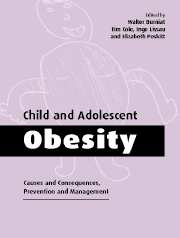Book contents
- Frontmatter
- Contents
- List of contributors
- Foreword
- Preface
- Part I Causes
- Part II Consequences
- Part III Prevention and management
- 12 Prevention
- 13 Home-based management
- 14 Dietary management
- 15 Management through activity
- 16 Psychotherapy
- 17 Drug therapy
- 18 Surgical treatment
- 19 Interdisciplinary outpatient management
- 20 Interdisciplinary residential management
- 21 The future
- Index
19 - Interdisciplinary outpatient management
Published online by Cambridge University Press: 02 November 2009
- Frontmatter
- Contents
- List of contributors
- Foreword
- Preface
- Part I Causes
- Part II Consequences
- Part III Prevention and management
- 12 Prevention
- 13 Home-based management
- 14 Dietary management
- 15 Management through activity
- 16 Psychotherapy
- 17 Drug therapy
- 18 Surgical treatment
- 19 Interdisciplinary outpatient management
- 20 Interdisciplinary residential management
- 21 The future
- Index
Summary
Social, biological and psychological factors interact in the development of obesity. Consequently, we believe an interdisciplinary team approach is necessary in order to cope with this multifactorial background. This enables varied technical expertise to create an integrated approach which can then develop into efficient and effective management of obesity in children.
The difference between the multidisciplinary approach and the interdisciplinary concept of treatment we present is a basic one. ‘Multidisciplinary’ suggests adding components to a process which then act in parallel upon a problem. ‘Interdisciplinary’ implies integration of different components to create a harmonious solution to a multifaceted problem. In this chapter, we present the various interventions, usually offered at outpatient treatment centres, then develop the possibilities and problems which arise from the need to integrate these interventions.
Goal and general philosophy
Enabling permanent change in a child's eating habits is one of the major aims in obesity management. The success of a treatment programme is measured in long-term maintenance rather than in short-term weight loss. This shifts the focus of treatment from kilograms and kilocalories, as the most relevant variables, to behavioural and attitudinal changes, as only these can lead to future maintenance of weight loss. However, eating behaviours and attitudes to food, body shape and health are influenced by a myriad of internal (metabolic, emotional, cognitive) and external (attractiveness and availability of food, educational practices) events. Research continues to expose complexity in the antecedents and consequences of eating behaviour.
- Type
- Chapter
- Information
- Child and Adolescent ObesityCauses and Consequences, Prevention and Management, pp. 361 - 376Publisher: Cambridge University PressPrint publication year: 2002
- 3
- Cited by



